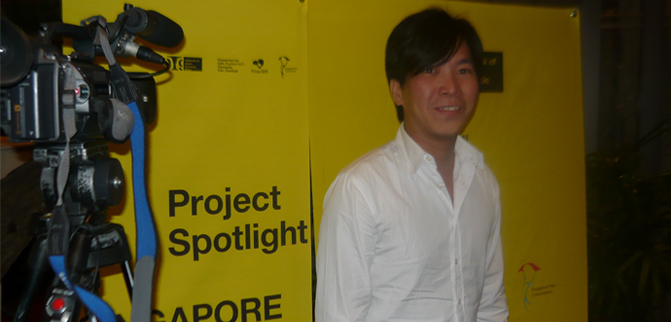SPOTLIGHT ON SINGAPORE
As part of PiFan’s NAFF event, there is an annual component which puts special focus on projects from one particular region. This year it is Singapore. Five filmmakers made their pitch complete with audio-visual props to an audience of press, investors and curious film-going Koreans. While not part of NAFF’s project competition, this display of the island state’s young film-making talent was both instructive and entertaining. Two Zombie films (Tough Meat and Dead Tide), one gently satirical superhero film, a military ghost movie (23:59 HRS) and a kind of softly softly childhood friends film that resembled a softly softly version of Peter Jackson’s Heavenly Creatures (Innocents). Well-presented, my money (If I was a producer) would be on Gilbert Chan’s army base ghost story 23:59 HRS. With an international cast (British, Australian, French, Singaporean and Japanese) and cross-cultural ghosts as well it seems well-designed to succeed beyond the small Singaporean market.

Gilbert Chan
CO-PRO PROBLEMS
At the second NAFF Forum, Singaporean film producer James Toh likened his experience on international co-productions to his experience the night before at a Korean BBQ restaurant. Having just presented his Singapore Indonesian co-production Macabre he and his crew decided to celebrate at a restaurant. The Indonesians being Muslim didn’t want to eat pork. The Singaporeans leaning to Buddhism didn’t want to eat beef. They all agreed that none of them wanted to eat dog. They then had to communicate this to a Korean restaurant proprietor who couldn’t speak English, Mandarin or Bahasa. It took considerable effort but they eventually succeeded (ie: they were fed and the film was made).
NO CHIEF AND NOT MANY INDIANS
No body missed Kang Han-sup, the former chairman of the Korean Film Council (aka KOFIC) at the KOFIC party at PiFan on Monday night. Recently dismissed due to ‘inefficient management’, the Korean film community sighed relief when he was shown the door. (I was on a jury with him a few years ago at Pusan. He was the type of guy who audibly ruminates on every plot point so the rest of the audience knows he is on top of things). However, paranoia is still quite rampant and the big fear is that the yet to be announced replacement will be even more damaging to the organization. The other rumour circulating is that several film bodies including KOFIC will be amalgamated in a move to cut staff and duplication of tasks. Now if you believe that rationale, there’s a bridge in Sydney I’d like to sell you.
Unfortunately KOFIC staff members were close to invisible. So there was no one around to confirm or deny. It was the most unofficial official function I’ve ever been to in South Korea. The party, though pleasant was unremarkable…except for what became known as the plastic exploding chair phenomenon. I was sitting at a table with a few friends including Anderson Le, when suddenly the Hawaii International Film Festival programmer was flat on his back wedged into the plastic seat of his chair which was suddenly devoid of its rear legs. Accidents happen. Twenty minutes later, an unidentified Korean guest found himself in the same position on the floor. The wooden chairs suddenly became a premium item. Another half hour, a third guest was on the floor caught in a collapsible two legged plastic chair. It was the last such fall of the evening, but surprising for how little sympathy the last guest got. When Anderson fell people were horrified. Two guests later it was such a regular occurence it seemed like a big joke. Fortunately no one was hurt.
